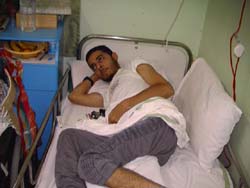17 January 2007
Occupied territory
BBC NEWS Israel's 'invisible hand' in GazaBy Alan Johnston
BBC News, Gaza
Although Israel withdrew from Gaza more than a year ago, its control over the lives of Palestinians there is in some ways even tighter than before, a new report by an Israeli human rights organisation says.
In the days after Israeli troops and settlers pulled out of the territory, the then Israeli leader, Ariel Sharon addressed the United Nations.
He declared "the end of Israeli control over and responsibility for the Gaza Strip".
But a study by Gisha challenges that claim. The organisation says it aims to "protect the fundamental rights of Palestinians living in the Occupied Territories by imposing human rights law as a limitation on the behaviour of Israel's military".
"Israel continues to control Gaza through an 'invisible hand'," the organisation says, in a detailed, 100-page report.
Gaza residents know that significant aspects of their lives depend on decisions made by Israel's military
Gisha report
"In contrast to the rhetoric used to describe the disengagement plan, Israel has not relinquished control over Gaza but rather removed some elements of control while tightening other significant controls."
Gisha argues that this means that Israel still has extensive legal obligations for the wellbeing of the territory's population that are not being met.
It says: "Gaza residents know that significant aspects of their lives - the ability to exit or enter Gaza, the supply of medicine, fuel and other basic goods, the possibility to transport crops to export markets, the ability to use electric lights - depend on decisions made by Israel's military."
My husband's ID card says he is married, but the box for spouse's name is blank. My children were born in Gaza to a mother who, officially, does not exist
Mirvat Alnahal
Palestinian lawyer with no ID
The report begins by referring to the continued, overt military pressure on Gaza.
Until the ceasefire declared in November, Israeli air raids, artillery fire and armoured incursions led to the deaths of hundreds of Palestinians.
This was all part of the army's confrontation with militant groups - like the Islamic Jihad organisation - which are based in Gaza.
On an almost daily basis they launch crudely made missiles at towns and villages in neighbouring southern Israel - often describing their attacks as retaliation for Israeli army actions in the occupied West Bank.
Less visible controls
But the new study focuses more on the much less visible forms of continuing Israeli control over Gaza.
GISHA: REMAINING CONTROLS
Military pressure
Effective control over Rafah crossing with Egypt, and frequent closure of Karni border crossing with Israel
Air and sea blockade
Control of Palestinian population registry
Control over aspects of areas of the Palestinian tax system
There is an air blockade. Israel has not allowed Gaza's international airport to re-open.
The Israeli navy continues to patrol the coastline in what it says in an effort to prevent arms smuggling. Palestinian fishing boats are sometimes fired on for straying outside Israeli-imposed zones.
The Israelis have also been able to maintain control over all Gaza's land links with the outside world - including the territory's border with Egypt.
There are no Israeli troops on the frontier any longer, but Israel's co-operation is required for the border crossing to function under an agreement struck between Israel, the Palestinian Authority, Egypt and the European Union.
That Israeli co-operation has frequently been withdrawn, and the border was closed for nearly half of the first year after Israel pulled out of Gaza.
Israeli control over the flow of goods in and out of the territory remains total. And frequent closures of the main cargo terminal at the Karni crossing point have had a devastating impact on the Gazan economy.
Security threats
The Israelis say the restrictions have been necessary on account of continual security threats. Two years ago there was an attack by militants at Karni that left several Israelis dead.
We would argue that to say legally that Israel has control of what goes on inside the Gaza Strip when there are no Israeli police, soldiers or civilians there is very far fetched
Israeli foreign ministry
But Palestinians believe that the border closures are part of a deliberate effort to maintain pressure on Gaza by strangling its economy.
The report also highlights a range of administrative controls.
It points out that Israel has retained control of the Palestinian population registry. This enables it to decide who can be a resident of Gaza - and who can come and go.
The reports says that tens of thousands of people have been barred from the registry and consequently have no identity papers.
The study sites the case of Mirvat Alnahal, a lawyer of Palestinian origin and who has lived in Gaza since the mid-1990s.
"I am trapped here. I cannot leave for fear that I won't be allowed to return," she says.
"My husband's ID card says he is married, but the box for spouse's name is blank. My children were born in Gaza to a mother who, officially, does not exist."
Crippled economy
The report stresses the importance of Israel's continuing control over areas of the Palestinian tax system.
And in its effort to apply pressure on the Hamas government, Israel has withheld payment of tax revenue it owes the Palestinians worth hundreds of millions of dollars.
The report points out that this has had a crippling impact on the services that the government has been able to provide - and the policy has constituted another example of Israel's ability to continue to exert significant control in Gaza.
The study ends by saying that despite the withdrawal of its soldiers, Israel's role in the territory means that it remains bound under international and humanitarian law to allow freedoms of movement and economic activity.
With continuing control comes continuing legal responsibility, the report says.
The Israeli government has completely rejected this conclusion.
Responding to the study, a foreign ministry spokesman said: "We would argue that to say legally that Israel has control of what goes on inside the Gaza Strip when there are no Israeli police, soldiers or civilians there is very far fetched.
"It doesn't hold water under international law."
Story from BBC NEWS:
http://news.bbc.co.uk/go/pr/fr/-/1/hi/world/middle_east/6270331.stm
Published: 2007/01/17 12:05:29 GMT
© BBC MMVII
Comment by DSH. The obligation to facilitate the return of the displaced persons as laid down in the UN Charter is not mentioned. This piece by Alan Johnston is included to inform readers who have not journeyed there.

